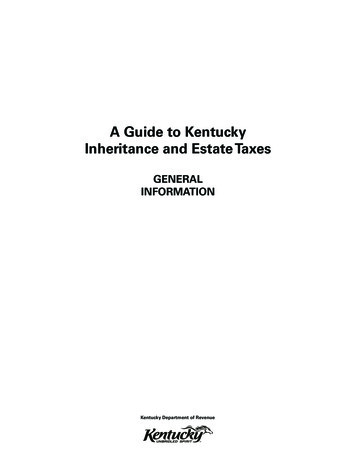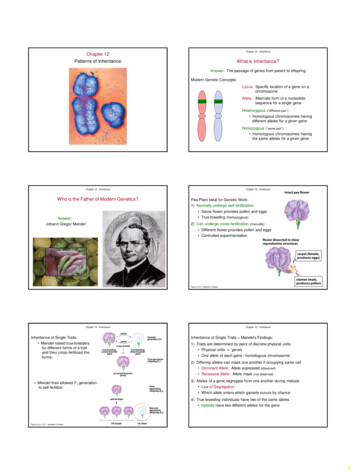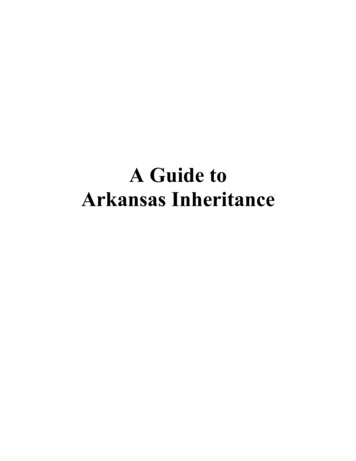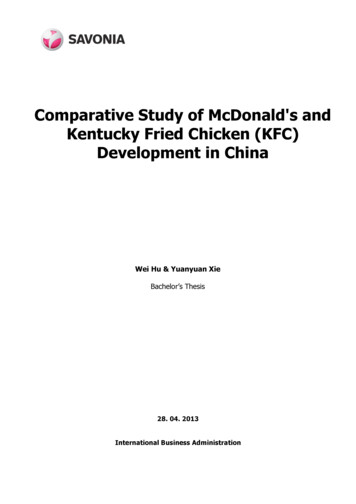
Transcription
A Guide to KentuckyInheritance and Estate TaxesGENERALINFORMATIONKentucky Department of Revenue
The purpose of this booklet is to help achieve the mission of the Kentucky Department of Revenue by offeringgeneral information concerning the Kentucky inheritance and estate tax.Kentucky Department of RevenueMission StatementAs part of the Finance and Administration Cabinet, the missionof the Kentucky Department of Revenue is to administer taxlaws, collect revenue, and provide services in a fair, courteous,and efficient manner for the benefit of the Commonwealthand its citizens.* * * * * * * * * * * * *The Kentucky Department of Revenue does not discriminateon the basis of race, color, national origin, sex, age, religion,disability, sexual orientation, gender identity, veteran status,genetic information or ancestry in employment or the provisionof services.If you have a question concerning any information contained in this booklet, or if you have any questions pertainingto a technical issue, please contact the Financial Tax Section, Kentucky Department of Revenue, Station 61, 501 HighStreet, Frankfort, Kentucky 40601-2103 or (502) 564-4810.
INTRODUCTIONKentucky has two death taxes.Inheritance TaxThe Kentucky inheritance tax is a tax on a beneficiary’s right to receive property from a deceased person. Theamount of the inheritance tax depends on the relationship of the beneficiary to the deceased person and the value of theproperty. Most of the time, the closer the relationship the greater the exemption and the smaller the tax rate. All propertybelonging to a resident of Kentucky is subject to the tax except for real estate located in another state. Also, real estate andpersonal property located in Kentucky and owned by a nonresident is subject to being taxed.If the inheritance tax is paid within nine months of date of decedent’s death, a 5 percent discount is allowed. Thetax due should be paid when the return is filed. However, if the beneficiary’s net inheritance tax liability exceeds 5,000and the return is filed timely, an election can be made to pay the tax in 10 equal annual installments. The first installmentis due at the time the return is filed. The portion of the tax deferred is charged with interest at the rate established by lawbeginning 18 months after the date of death.There are three classes of beneficiaries: Class A, Class B, and Class C.Class A beneficiaries include:surviving spouse, parent, child, grandchild, brother, sister, half-brother, and half-sisterIf the date of death is after June 30, 1998, all Class A beneficiaries are exempt from paying Kentuckyinheritance tax.Class B beneficiaries include:niece, nephew, half-niece, half-nephew, daughter-in-law, son-in-law, aunt, uncle, great-grandchildNote: nieces and nephews by marriage and great-nieces and great-nephews are Class C beneficiaries.Class B beneficiaries receive a 1,000 exemption and the tax rate is 4 percent to 16 percent. See tax chart on page 6.Class C beneficiaries include all persons not included in Class A or Class B. Cousins are considered Class C beneficiaries.Class C beneficiaries receive a 500 exemption and the tax rate is 6 percent to 16 percent. See tax chart page 6.1
Estate TaxSince January 1, 2005, there has been no Kentucky estate tax.The American Taxpayer Relief Act was signed into law on January 2, 2013 and permanently extends the deductionfor state estate taxes on the Federal 706. Before 2005, a credit was allowed against the federal estate tax for stateestate, inheritance, legacy, or succession taxes. The Economic Growth and Tax Relief Reconciliation Act of 2001 (EGTRRA)repealed the state death tax credit for decedents dying after 2004 and replaced the credit with a deduction. Kentuckyestate tax is equal to the amount by which the credits for state death taxes allowable under the federal tax law exceedsthe inheritance tax, less the discount, if taken by the taxpayer. Since state death taxes are no longer treated as a credit forfederal estate taxes, there is no Kentucky estate tax.For answers to questions pertaining to the filing of a Federal Estate and Gift Tax Return, you can call the IRS at(800) 829-1040.2
AFFIDAVIT OF EXEMPTIONOn June 18, 1999, the Kentucky Department of Revenue sent a memorandum to the District Judges in theCommonwealth of Kentucky requesting that an Affidavit of Exemption be accepted in place of an Inheritance and EstateTax Acceptance Letter for final settlement and closing of the administration of an estate. The affidavit should be used onlywhen the entire estate passes to nontaxable beneficiaries and a United States Estate and Gift Tax Return is not required tobe filed under federal law and applicable regulations.Using this form will eliminate expending time and money for the preparation and review of Inheritance and EstateTax Returns. The Affidavit of Exemption should ease the administration of estates that do not owe any Kentucky death taxand are not required to file a Federal Estate and Gift Tax Return. If you have questions, contact Financial Tax Section, (502)564-4810.If an Affidavit of Exemption is submitted to the Court, do not send a copy of the affidavit to the Kentucky Departmentof Revenue.3
92A300 (9-13)AFFIDAVIT OF EXEMPTIONAffiant , being first duly sworn, states that he/she is fiduciary or beneficiaryof the estate of , who died on the day of , , aresident of County, Kentucky.Affiant states that all assets of the estate pass to exempt beneficiaries pursuant to Kentucky Revised Statute140.080* or exempt organizations pursuant to Kentucky Revised Statute 140.060** either by virtue of thedecedent’s will, the intestate laws of this state, or by contract (survivorship, payable on death, trust, etc.).Affiant further states that a Kentucky Inheritance Tax Return will not be filed since no death tax is due thestate and a Federal Estate and Gift Tax Return (Form 706) is not required to be filed because the gross estateis less than the required amount set out in Section 2010(c) of the Internal Revenue Code. This affidavit is beingsubmitted to satisfy the requirements of Kentucky Revised Statute 395.605.SignatureWitness my hand this day of , .Sworn and subscribed to before me bythis day of , .Notary PublicMy commission expires*Exempt beneficiaries under KRS 140.080 include spouse, children, stepchildren, grandchildren, parent, brother,and sister.**Exempt organizations include educational, religious or other institutions, societies, or associations, whosesole purpose is to carry on charitable, educational, or religious work. Also, cities, towns or public institutionsin this state qualify as exempt organizations provided that any transfer to such an organization is for publicpurposes.4
FILING AND PAYMENT INFORMATIONEFFECTIVE July 1, 1998A tax return must only be filed by the personal representative when any part of the estate passes to taxablebeneficiaries or a Federal Estate and Gift Tax Return is required to be filed.If all taxable assets pass to exempt beneficiaries, and a Federal Estate and Gift Tax Return is not required, anAffidavit of Exemption will be accepted by the court for final settlement and closing of the administration of an estate. It isnot necessary to file a No Tax Due Inheritance Tax Return with the Kentucky Department of Revenue. If an Affidavitof Exemption is submitted to the Court, do not send a copy of the affidavit to the Kentucky Department of Revenue.A copy of the Affidavit of Exemption and tax returns can be obtained from the Financial Tax Section, KentuckyDepartment of Revenue, Station 61, 501 High Street, Frankfort, Kentucky 40601-2103, or by calling (502) 564-4810, or fromthe taxpayer service center in your area. See inside back cover for a listing of these centers. They can also be downloadedfrom our website at revenue.ky.gov/forms/curhrfrms.htmIf taxes are due, when must the forms be filed?If taxes are due, the return must be filed within 18 months from the date of the decedent’s death. If the tax due isnot paid within 18 months of death, interest and perhaps penalties are due. Filing the tax return should not be postponeddue to the delay in receiving the federal estate tax audit or closing letter or because the real estate is being sold.5
570 8%of Amt.over 10,000 1,370 10% ofAmt. over 20,000 2,370 12% ofAmt. over 30,000 1,460 8% of Amt.over 30,000 30,000 45,000 4,170 14% ofAmt. over 45,000 2,660 10% ofAmt. over 45,000 45,000 60,000 6,270 16% ofAmt. over 60,000 4,160 12% ofAmt. over 60,000 60,000 100,000 12,670 16% ofAmt. over 100,000 8,960 14% ofAmt. over 100,000 100,000 200,000 28,670 16% ofAmt. over 200,000 22,960 16% ofAmt. over 200,000 200,000and overA. Compute each beneficiary’s tax separately.B. Do not deduct the beneficiary’s exemption from the distributive share. The tax shown in the table for each distributive share bracket automatically applies the allowableexemption.C. Determine the proper classification of the beneficiary at the left of the table.D. Follow the tax table across to distributive share bracket at the top of the table that includes the distributive share of that beneficiary.E. The tax applicable to that beneficiary’s distributive share is the amount shown plus the designated percentage of the amount by which the distributive share exceeds the baseof the distributive share bracket.INSTRUCTIONS FOR USING INHERITANCE TAX TABLE ABOVE* Nephews and nieces by marriage and great-nephews and great-nieces are Class C beneficiaries.CLASS C06% of Amt.over 500All persons not included in Classes A or B and educational, religious,or other institutions, societies or associations, or public institutions notExemptionexempted by KRS 140.060 500 30 6%of Amt.over 1,000 860 6%of Amt.over 20,000CLASS B004% of Amt. 360 5%overof Amt.*Nephew, niece, half-nephew, half-niece, daughter-in-law, son-in-law, 1,000overaunt, uncle, or great-grandchild who is grandchild of child by blood, 10,000stepchild or child adopted during infancy .Exemption 1,000 1,000 10,000 20,000 30,000 500 1,000 10,000 20,000CLASSIFICATIONOF BENEFICIARY 500or lessDISTRIBUTIVE SHARE BRACKETS(1) Surviving spouse, parent(2) Child (adult or infant)child by blood, stepchild, child adopted during infancy, or a child adopted during adulthood who was reared bydecedent during infancy(3) Grandchildissue of child by blood, stepchild, child adopted during infancy, or of a child adopted during adulthood who wasreared by decedent during infancy(4) Brother, sister (whole or half)CLASS A—The following list of beneficiaries are exempt from paying inheritance tax.(APPLICABLE FOR DATES OF DEATH ON OR AFTER JULY 1, 1998)INHERITANCE TAX TABLEFOR ESTATES OF DECEDENTS WHO WERE RESIDENTS OF KENTUCKY
If tax is due, what must be included on the return?In general, all real and personal property in which the decedent owned or has an interest must be included on thetax return.Example of taxable property:Real estateCashBank accounts even if located outside of KentuckyCertificates of depositMoneyStock, bondsLife insurance payable to the insured or to the estateAnnuitiesDebt due the decedentUnpaid balance of mortgages, notesHousehold goodsLivestockGrowing cropsFarm machineryAutomobilesIncome tax refundsBoats, travel trailersRoyaltiesJewelryAntiquesHow must property included on the tax return be valued?Most of the time all real and personal property must be reported at its fair cash value on the date of decedent’sdeath. Under certain conditions when real estate passes to a son-in-law or a daughter-in-law the real estate can be valued atits agricultural or horticultural value. Since special rules apply, for more information please contact the Financial Tax Section,Kentucky Department of Revene, Sta. 61, 501 High Street, Frankfort, KY 40601-2103, or call (502) 564-4810.What about gifts made before death? Are they taxable?Any gift made within three years of death is subject to being taxed unless the gift was made for a living reason andnot in contemplation of death.7
If a tax return has to be filed, what deductions are allowed in the Kentucky Inheritance Tax Return?Funeral expenses up to 5,000Attorney’s feesPersonal representative commissionsDebts and taxes owed by the decedentReal property taxesMortgagesIf the decedent was a resident of Kentucky, is property located outside of the state taxable?If the decedent was a resident of Kentucky, all intangible property located outside of Kentucky is taxable. Undercertain conditions partnership property located in another state is taxable. Real estate is taxable in the state where it islocated. So, if a Kentucky resident owned real estate in another state, that real estate is not taxable for Kentucky inheritancetax purposes. If a Kentucky nonresident owned real estate in Kentucky, then that property is subject to Kentucky inheritancetaxes.How are assets distributed?When a person dies, real and personal property may pass by title, under the terms of the will, or by the laws ofKentucky. Survivorship property and property payable on death passes to the surviving co-owner shown on the deed orinstrument, unless a disclaimer was filed, and not by the terms of the will or by the laws of intestate succession. When aperson dies with a will, distribution of the estate is made according to the will, unless the will is renounced by the survivingspouse or a disclaimer is filed. If the will is renounced, the surviving spouse receives one-third of the real property andone-half of surplus personalty. The law provides that when a person dies without a will, one half of the estate, after funeralexpenses, debts, and cost of administration are paid, goes to the surviving spouse and one-half descends as follows (ifthere is no surviving spouse, the whole estate descends):1. to his children and their descendants (descendants take the share of their deceased parents); if there are none,2. to his father and mother; if one is deceased, to the survivor; if there is no father or mother,3. to his brothers and sisters and their descendants; (half-brothers and half-sisters and their descendants inherit only onehalf as much as those of the whole blood); if none,4. to the husband or wife of the intestate; if none,5. one share shall pass to the paternal and the other to the maternal kindred in the following order:(a) the grandfather and grandmother equally, if one is deceased, it shall go to the survivor; if both are deceased,(b) to the uncles and aunts and their descendants; if there are none,(c) to the great-grandfathers and great-grandmothers; if none,(d) to the brothers and sisters of the grandfathers and grandmothers; and6. if there is no kindred to one of the parents as described in (5), the whole descends to the kindred of the other. If thereis neither paternal nor maternal kindred, the whole descends to the kindred of the spouse.What are the exemptions, if the decedent was a nonresident of Kentucky?The exemption for a beneficiary of a nonresident decedent’s estate is prorated based on the exemption of aresident decedent and is in the proportion to the net value of the property subject to tax in Kentucky before federal estatetaxes to the total property transferred by the decedent.8
DefinitionsAcceptance Letter—A form letter issued by the Department of Revenue as proof that the Inheritance and Estate TaxReturn has been filed, the examination has been completed, and that all taxes due have been paid.Administration—The collection of a decedent’s assets, the payment of his/her debts, and the distribution of any remainingassets.Administrator/Administratrix—A person appointed by the court to administer the assets and liabilities of a decedent.Beneficiary—A person who is lawfully entitled to the proceeds or property of an estate.Bequest—A gift of property by will.Decedent—A person who has died.Descendant—A person who is an offspring, however remote, of a certain ancestor.Distribution—The apportionment and disposition, by authority of a court, of the balance of an estate’s personal propertyafter payment of debts and costs.Dower/Curtesy—The surviving spouse’s (husband or wife) interest in the deceased spouse’s estate who died without awill.Estate—The property of a person; often a decedent’s property in the process of administration.Estate Tax (Kentucky)—The amount by which the allowable federal state death tax credit exceeds the Kentucky inheritancetax. As of January 1, 2005, there is no Kentucky Estate Tax.Executor/Executrix—A person named in a will to take charge of the deceased’s estate and administer or dispose of it asdirected in the will.Fiduciary—A person or institution who legally manages money or property for another.Gift—A lifetime transfer of property from one individual to another without full payment.Gift in Contemplation of Death—A lifetime gift made in expectation of the death. The thought of death prompted thegift. Any gift made within three years of death is considered to have been made in contemplation of death unless proof isfurnished to the contrary.Heir—One who inherits or is entitled, by law or by terms of the will, to inherit the estate of another.Inheritance—The property received from a deceased person, by law or by will.Inheritance Tax—A tax based on the right to receive property from a decedent’s estate. The amount of tax is based on thebeneficiary’s share and relationship to the decedent.Intestate—A person who is said to die intestate when he dies without a will, or dies without leaving anything to testifywhat his wishes were with respect to the disposal of his property after his death.Joint Tenant With Right of Survivorship—A person(s) becomes entitled to property by reason of having survived anotherperson who had an interest in the property.9
Per Capita—If the beneficiaries are to share in a distribution “per capita,” then all of the living members of the identifiedgroup will receive an equal share. However, if a member of the identified group is deceased, then a share won’t be createdfor the deceased member and all of the shares of the other members will be increased accordingly.Per Stirpes—If the beneficiaries are to share in a distribution “per Stirpes,” then the living member in the class of beneficiarieswho is closest in relationship to the person making the distribution will receive an equal share. However, if a member inthe class of beneficiaries who is closest in relationship to the person making the distribution is deceased and survived byany descendants, then that deceased beneficiary’s descendants will take “by representation” what their deceased parentwould have taken.Personal Representative—A person appointed by district court who succeeds in title to the decedent’s probate estate andhas the power and duty to settle and distribute the estate as required by law.Probate—A formal, legal proving of a will and its acceptance by the court having jurisdiction over the administration ofestates. This term also includes all matters and proceedings pertaining to administration of estates, including intestateestates, guardianships, etc.Tenant in Common—A form of ownership whereby each owner holds an undivided interest in the property. When oneowner dies, his share of the property is included in his estate rather than becoming the property of the other co-owner.Testate—Having made a will prior to death.Trust—A right of property, real or personal, held by one party for the benefit of another. Any arrangement whereby propertyis transferred with intention that it be administered for another’s benefit.Will—A document prepared by a natural person in contemplation of death and containing instructions for the dispositionof his property.Every effort and care has been taken in the preparation of this booklet. However, the possibility of mechanical and/or human error does exist.In the event that any information in this booklet is later determined to be in error, this booklet cannot be used bytaxpayers in supporting a specific position or issue before the Kentucky Department of Revenue, as it does not havethe statutory or regulatory authority. This booklet does not address technical issues.Should you need assistance, please contact the Financial Tax Section, Kentucky Department of Revenue, Station61, 501 High Street, Frankfort, Kentucky 40601-2103, (502) 564-4810. You can also contact one of the local taxpayerservice centers. See inside back cover for a listing of these centers.10
Where Can I Get Help?Ashland, 41101–76951539 Greenup AvenueTelephone: (606) 920-2037Fax: (606) 920-2039Bowling Green, 42104–3278201 West Professional Park CourtTelephone: (270) 746-7470Fax: (270) 746-7847Corbin, 40701–618815100 North US25E, Suite 2Telephone: (606) 528-3322Fax: (606) 523-1972Frankfort, 40601501 High Street, Tenth FloorTelephone: (502) 564-5930Fax: (502) 564-8946Hopkinsville, 42240–7926181 Hammond DriveTelephone: (270) 889-6521Fax: (270) 889-6563Louisville, 40202–2310600 West Cedar Street2nd Floor WESTTelephone: (502) 595-4512Fax: (502) 595-4205Northern KentuckyTurfway Ridge Office Park7310 Turfway Rd., Suite 190Florence, 41042-4871Telephone: (859) 371-9049Fax: (859) 371-915411Owensboro, 42301–6295Corporate Center401 Frederica StreetBuilding C, Suite 201Telephone: (270) 687-7301Fax: (270) 687-7244Paducah, 42001–40242928 Park AvenueClark Business Complex, Suite GTelephone: (270) 575-7148Fax: (270) 575-7027Pikeville, 41501–1275126 Trivette DriveUniplex Center, Suite 203Telephone: (606) 433-7675Fax: (606) 433-767992F101 (7-14)Printed with State Funds
If the inheritance tax is paid within nine months of date of decedent’s death, a 5 percent discount is allowed. The tax due should be paid when the return is filed. However, if the beneficiary’s net inheritance tax liability exceeds 5,000 and the return is filed timely, an election ca











